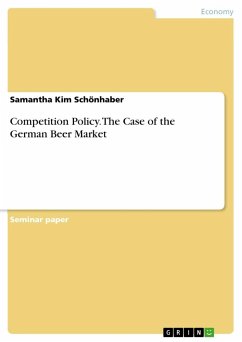Seminar paper from the year 2020 in the subject Business economics - Miscellaneous, grade: 2,3, University of applied sciences Frankfurt a. M., course: MBA, language: English, abstract: This assignment will give an overview on competition policy on the example of the German beer market. This includes the definition of how a price is determined and what the characteristics of a competitive market are. The German beer market will be described as an example of a competitive market. Subsequently the case "Bußgelder gegen Brauereien B10-105/11" investigated by the Bundeskartellamt in 2014 will give a practical example for price agreements.Competition is a phenomenon in the economy. It is characterized by the existence of markets and at least two suppliers and buyers in competition with each other. The advantageous features of the price mechanism in a competitive market only arise if there is competition between suppliers. Competition does not necessarily exist of its own accord. The core business objective of companies is to generate profits. The less competition there is in the market, the easier this goal can be achieved.The beer market in Germany is chosen as the example for a competitive market because numerous suppliers offer their products to numerous customers. Last year the number of breweries grew to 1,548 in total. While 20 years ago the number of breweries was 1,281 (1999), it has increased by 267 businesses in the last two decades.With total beer sales of 92 million hectolitres - excluding nonalcoholic beers - Germany continues to be the largest producer of beer in Europe.
Hinweis: Dieser Artikel kann nur an eine deutsche Lieferadresse ausgeliefert werden.
Hinweis: Dieser Artikel kann nur an eine deutsche Lieferadresse ausgeliefert werden.








